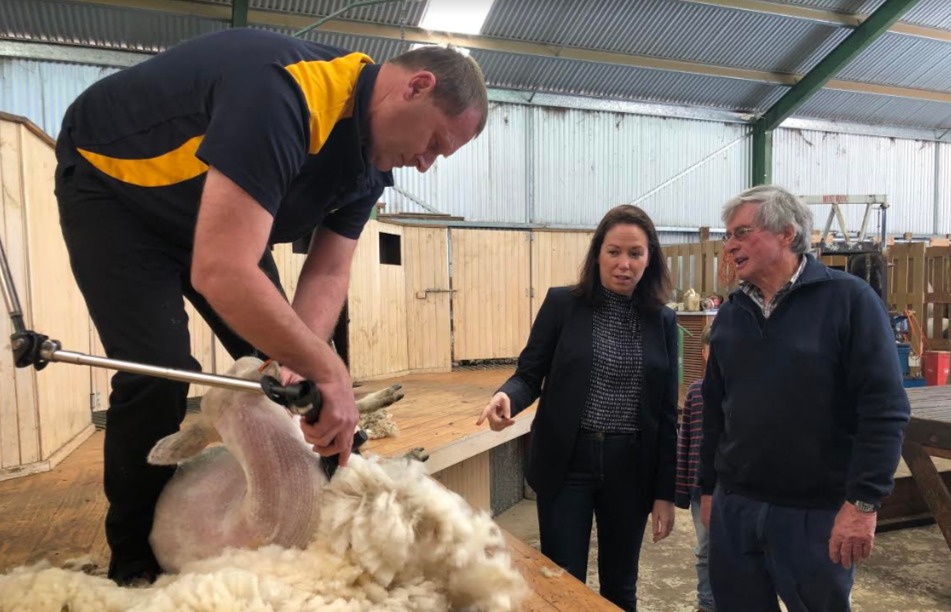
SCAA Shearer-Wool Handler Training CEO Glenn Haynes demonstrates shearing for Agriculture Minister Jaclyn Symes and wool producer Roger Brown.
VICTORIA’S State Government re-committed to a $1.2 million 2018 election commitment to shearer training at a Hamilton farm yesterday.
At the Brown family’s farm, Minister for Agriculture Jaclyn Symes said the government’s $1.2 million investment will support Victorian TAFE and shearing training providers.
Ms Symes said the State Government was working to ensure the state’s pool of highly-skilled shearers is keeping up with the growth of Victoria’s wool industry in Victoria and upholding our reputation for quality produce.”
“With more qualified shearers, we will see the quality of wool sheared in Victoria improve and cement our reputation for providing world-class wool products.”
Minister for Training and Skills Gayle Tierney said students shouldn’t have to move far away from home to get a great education.
“And we’re proud to be supporting more shearing trainers to be spread over more locations across Victoria.”
Projects to be funded include creation of a modified entry level qualification to help uptake and retention rates at the Certificate II and Certificate III levels, a scholarship program to encourage experienced shearers to become trainers via an individualised Certificate IV course, the upgrading of learning resources and a campaign to boost the image of shearing as a career option.
The initiatives are aimed at assisting more experienced shearers to undertake training roles, improving shearing’s image and countering the shearer shortage and loss of expatriate New Zealand shearers back to their home country. The investment will involve input from the main shearer training providers and funders such as RIST at Hamilton, the Shearing Contractors Association of Australia’s Shearer/Wool Handler Training, Australian Wool Innovation and now South West TAFE, which continues to run wool classer training.
RIST chief executive officer Bill Hamill has been doing shearer training for 26 years, but said the industry needs more investment to deal with the shearer shortage, lift shearing’s image and attract more people.
“It’s a great industry, people have made significant livelihoods out of it and it is a positive modern industry.
“If we didn’t have the New Zealand workers here (shearers and wool handlers) we would be in real trouble.”
South West TAFE executive manager – education at Warrnambool John Flett said SW TAFE’s role is to set up the scholarship program for skilled shearers to become trainers and to create the individualised Certificate IV training and assessment program to suit the shearing season.
“It’s really positive to have a co-ordinated approach.”
SCAA Shearer/Wool Handler Training CEO Glenn Haynes said the funding will enable SCAA to run introductory five-day courses and put those more out into the regions for people who can’t afford to take two weeks off work and pay accommodation in places like Ballarat etc, “because they don’t get paid while they are not working obviously.”
Mr Haynes said there good young shearers coming through all Australian states.
“We do need more shearers at certain times of the year.”
He said although the shearing rate in New Zealand was not as high as in Australia, this was countered by the type of sheep, mainly easier combing crossbreds, across the Tasman Sea.
“If you are doing 200 sheep a day here, you can do 300 sheep over there easily.” All states had lost shearers and wool handlers who have gone back to New Zealand, he said. Mr Haynes said there also needed to be more investment in wool handler training.
“I think that is a really big thing that needed to be looked at, but we will still teach wool handling in these five day courses although the main focus will be on shearing.”
Wool producer Roger Brown said it was often difficult to good shearers and any shearers at peak times of the year. His Hamilton-based contractor was a NZ expatriate and had to bring shearers in from South Australia and New South Wales, and sometime Western Australia and Queensland.
“Quite often all he would have to say is ‘I’ve got a stand and they would come over, but since the (NZ) rates have gone up more are opting to stay at home.” Mr Brown said there needs to be more co-ordinated investment in shearer and wool handler training.
“It seems to me there is a little bit here and little bit there.”
South West TAFE is aiming to have the scholarships promoted and filled by the end of the year, with the full Certificate IV in Training and Assessment program starting early next year.

For every five shearers, you need 3-4 wool handlers, one presser and a wool classer. So skilled wool handlers and pressers are also a necessity to the wool industry. The lack of training and being able to fill these positions is taking a direct toll on the quality assurance of Australian wool. I believe proper training and upskilling in these areas, as well as shearing, will improve product integrity, efficiency and price overall.
The overweight problem of some crossbred sheep and rams needs to be addressed. Just paying more money doesn’t help the problem of injuries to good young shearers. Travelling cradles and equipment can be introduced to help out. Contractors could co-ordinate to have rams shorn in groups in each district.
Not only do we need shearing training, we need training for wool handlers, pressers and for farm management and preparation. We also need training on how to maintain a safe working environment such as handling machinery, no sharp edges or tin in catching pens or forcing pens. Poking nails, holes in floors, decayed catching doors, closed board operations are a massive fail. The list goes on.